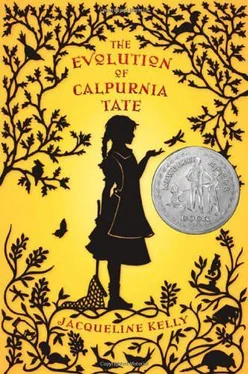Jacqueline Kelly - The Evolution of Calpurnia Tate
Здесь есть возможность читать онлайн «Jacqueline Kelly - The Evolution of Calpurnia Tate» весь текст электронной книги совершенно бесплатно (целиком полную версию без сокращений). В некоторых случаях можно слушать аудио, скачать через торрент в формате fb2 и присутствует краткое содержание. Город: New York, Год выпуска: 2009, ISBN: 2009, Издательство: Macmillan : Henry Holt and Company, Жанр: Детская проза, на английском языке. Описание произведения, (предисловие) а так же отзывы посетителей доступны на портале библиотеки ЛибКат.
- Название:The Evolution of Calpurnia Tate
- Автор:
- Издательство:Macmillan : Henry Holt and Company
- Жанр:
- Год:2009
- Город:New York
- ISBN:978-0-8050-8841-0
- Рейтинг книги:5 / 5. Голосов: 1
-
Избранное:Добавить в избранное
- Отзывы:
-
Ваша оценка:
- 100
- 1
- 2
- 3
- 4
- 5
The Evolution of Calpurnia Tate: краткое содержание, описание и аннотация
Предлагаем к чтению аннотацию, описание, краткое содержание или предисловие (зависит от того, что написал сам автор книги «The Evolution of Calpurnia Tate»). Если вы не нашли необходимую информацию о книге — напишите в комментариях, мы постараемся отыскать её.
The Evolution of Calpurnia Tate — читать онлайн бесплатно полную книгу (весь текст) целиком
Ниже представлен текст книги, разбитый по страницам. Система сохранения места последней прочитанной страницы, позволяет с удобством читать онлайн бесплатно книгу «The Evolution of Calpurnia Tate», без необходимости каждый раз заново искать на чём Вы остановились. Поставьте закладку, и сможете в любой момент перейти на страницу, на которой закончили чтение.
Интервал:
Закладка:
“Got it.”
We walked to the river. On the way, we stirred up a herd of deer that crashed away through the underbrush and disappeared in two seconds flat. This of course raised the subject of deer and something Granddaddy called the food chain and each animal’s place in the natural order.
We came to a shallow blind inlet ringed by a thick fringe of mossy green growth. The cooler air and stagnant water smelled of mud and rot. Frantic tadpoles zigzagged away from our shadows; some good-sized creature splashed into the water upstream from us, an otter, maybe, or a river rat. A pair of swallows rushed by, skimming for insects a few inches above the water.
We set down our satchels, and Granddaddy unpacked the microscope and assembled the barrel and the lenses, each of which had a cunning nesting place in the velveteen-lined box. He showed me how the pieces fit together. “Here, you do it,” he said. The brass cylinder felt cool and heavy in my hands. I knew I was being trusted with something precious. Then he placed the case on a flat rock and balanced the microscope on top of it.
“Now,” he said, handing me two thin pieces of glass, “choose your droplet of water.”
“Any droplet?” I asked.
“Any one will do.”
“There are so many to choose from,” I said.
He smiled. “You will see more interesting things the closer your sample is to the green river plants growing here.”
I bent and dipped my fingertip into the water, picking my droplet, then let it fall on one piece of glass. He instructed me to put another slip of glass on top.
“Now place it here on the platform,” he said. “That’s right. The tricky part is to turn this reflector so that it catches the sunlight at the best angle. You want enough light to illuminate your subject but not so much that the details get washed out.”
I fumbled with the reflector and put my eye to the barrel, sure that something momentous was about to appear. What I saw could only be described as a field of pale gray fog. It was supremely disappointing.
“Um, Granddaddy . . . there’s nothing here.”
“Take the focus knob, here”—he took my hand—“and slowly turn it away from you. No, don’t look up. Keep looking while you turn.”
An awkward exercise.
“Do you have enough light?” he said. “Don’t forget your reflector.”
Then it happened. A teeming, swirling world of enormous, wriggling creatures burst into my vision, scaring the daylights out of me.
“Ook!” I cried and jumped back, almost overturning the whole apparatus. “Hewww,” I said, steadying the microscope. I looked up at Granddaddy.
“I take it you saw your first microscopic creatures,” he said, smiling. “Plato said all science begins with astonishment.”
“My goodness,” I said and looked through the eyepiece again. Something with many tiny hairs rowed past at high speed; something else with a lashing tail whipped by; a tumbling barbed sphere like a medieval mace rolled past; delicate, filmy ghostlike shadows flitted in and out of the field. It was chaotic, it was wild, it was . . . the most amazing thing I’d ever seen.
“This is what I swim in?” I said, wishing I didn’t know. “What are these things?”
“That’s what we’ll find out. Perhaps you should sketch a few of them so we can identify them later from the texts.”
“Sketch them? But they’re moving so fast.”
“In truth, it’s a challenge. Here’s a pencil.”
I perched next to the scope and looked and sketched and looked and sketched as best I could. After a while, I noticed that some of the creatures started reappearing, which made drawing them easier. Granddaddy hummed Vivaldi and puttered nearby with his straining net. I chewed my pencil and frowned at my artwork, which consisted of awkward, blobby forms scattered across the page.
“I’m sorry to say that these aren’t much good,” I said, showing my page to Granddaddy.
“As artwork goes, you are entirely correct in your appraisal. But the more important point is this: Are these representations true enough so that you can match them with the examples in the atlas once we get back to the library? If that is the case, then you have done an acceptable job.”
“I think I might be able to tell,” I said, “but I’m not sure I can ever swim in the river again.”
“All these creatures are completely harmless, Calpurnia, and they have enjoyed the river for many more eons than you. In addition, console yourself with the thought that you swim in the river proper, and these animals are not happy in flowing water.”
“All right,” I said. But still.
The bushes rustled, and Father’s dog Ajax trotted up, pleased with himself for having found us. He had no doubt been out courting Matilda, Mr. Gates’s bluetick hound, she of the unique yodeling cry that could be heard all over town. He greeted us in turn, nosing us for a pat, then splashed into the shallows and slurped at the brackish water. A fist-sized turtle plopped off a rotting log and Ajax charged clumsily after it. He enjoyed the game of chasing turtles and other small river creatures, but I’d never seen him actually catch anything aquatic. He was, more properly, a specialist in avian studies. But this time he surprised me by ducking his whole head underwater and coming up, startled, with an equally startled turtle in his mouth.
“Ajax,” I said, “what are you doing? Stop it. Put that back where it belongs.”
He pranced back to us, pleased with himself, and dutifully laid the turtle at our feet before shaking water all over us. He sat and looked up at me expectantly.
“He thinks he’s doing his job,” said Granddaddy. “You had better praise him or all your father’s training will be for nothing.”
“Oh, Ajax. Good boy, I guess.” I gave him a pat. “What are we going to do with your turtle? Travis already has one in his room, and I doubt that Mother will tolerate another. Perhaps you should hold his collar while I let this one go.”
“I’ll walk him up the bank,” said Granddaddy. “He shouldn’t see you letting it go, or he will come to question the purpose of his work and eventually grow disheartened.” He led Ajax away, and when they were both out of sight I inspected the turtle. Why had it allowed itself to be captured by such a large, dumb land creature? Was it old? Was it sick? There was nothing obviously wrong with it. It looked like every other turtle in the river. Maybe it was simply stupid. Maybe it was better that it died so that it wouldn’t produce more generations of stupid baby turtles. But too late, I had interfered and thus made myself responsible for its safety. Wondering if I was, in my own small way, promoting the survival of the unfittest, I pushed it into the water, where it disappeared in a wink.
“It’s all right,” I yelled over my shoulder. “You can let him go.”
I climbed up the bank after them, and Ajax met me at the top, sniffing at me for his turtle. “It’s gone,” I said, showing him my empty hands. “See?” I swear he understood me because his ears drooped and he turned away.
“It’s gone, Ajax, I’m sorry. Come here and be a good dog.” I ruffled his coat and thumped his sides the way he liked, even though I knew I would stink like a wet dog for the rest of the day. “There’s a good boy. You’re a good boy.” This cheered him up some, and he forgave me enough to walk with me while we caught up to Granddaddy.
Ajax found the biggest burrow I’d seen in a long while. It looked and smelled like a badger’s hole, and badgers were getting rare in our part of the world. He amused himself by sticking his muzzle deep inside and sniffing in excitement.
“What do you see there?” I called out to Granddaddy, who peered with interest at a small, uninteresting plant. “Come on, Ajax.” I hauled on his collar to keep him from losing the end of his nose to a swipe from the burrow’s notoriously irritable tenant.
Читать дальшеИнтервал:
Закладка:
Похожие книги на «The Evolution of Calpurnia Tate»
Представляем Вашему вниманию похожие книги на «The Evolution of Calpurnia Tate» списком для выбора. Мы отобрали схожую по названию и смыслу литературу в надежде предоставить читателям больше вариантов отыскать новые, интересные, ещё непрочитанные произведения.
Обсуждение, отзывы о книге «The Evolution of Calpurnia Tate» и просто собственные мнения читателей. Оставьте ваши комментарии, напишите, что Вы думаете о произведении, его смысле или главных героях. Укажите что конкретно понравилось, а что нет, и почему Вы так считаете.












